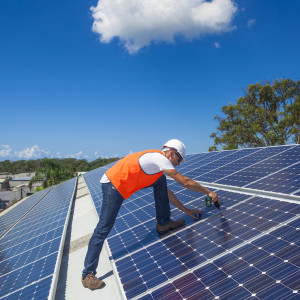The sun-kissed state of Arizona seems an obvious place for the solar energy craze to really catch fire, which to some extent it has. But Arizona’s also a good place to see the potential shadier side of the solar industry in action, as companies jockey to cash-in and carve out a slice of the pie, with the help of generous taxpayer subsidies and government-mandated markets.
Perhaps it’s not surprising, then, that Arizona’s also where some of the shine may be coming off solar, as watchdogs begin asking questions about how the industry is operating.
It’s no doubt been a sweet and easy ride for solar energy in recent years, given the political favoritism and fawning media treatment that almost always casts it in warm and positive light. It’s hard to pick-up a paper or surf news sites without reading or seeing some breathless account of solar’s latest breakthrough. Some media cheerleaders even have taken to calling 2015 the “Year of Solar Energy” (as long as the subsidies and mandated-markets don’t go away).
But that long loving honeymoon may finally be coming to an end, as more watchful members of Congress, along with the Arizona Corporation Commission, finally are taking note of the questionable practices through which the solar rush is gaining ground. Two recent developments signal a welcome new skepticism regarding the government-backed blob some call “Big Sun.”
The first is a December 12 letter from a dozen members of Congress – two from the Grand Canyon State, Reps. Matt Salmon and Paul Gosar — to the U.S. Federal Trade Commission (FTC), asking Chairwoman Edith Ramirez to investigate “potentially deceptive sales tactics” that rooftop solar companies may be using to lure people into long-term leases. “As a very new industry with a limited track record and little regulatory oversight,” reads the letter in part, “the solar leasing market may pose a considerable risk to the increasing numbers of American consumers that commit to the leasing product without all of the relevant information (not to mention the American taxpayer, who heavily subsidizes each rooftop solar project).”
Then came news that the Arizona Corporation Commission would be investigating allegedly-questionable business practices and leasing “deals” by companies jumping aboard the rooftop solar bandwagon. “Leasing is the most popular avenue for going solar because it’s seen as a way for homeowners to “save money and energy” without the upfront costs of buying solar systems outright. In Arizona, roughly 80 percent of all solar customers lease their systems,” reported radio station KJZZ. “But consumers, Arizona Attorney General Tom Horne, and members of Congress have been raising concerns that leasing companies might be using deceptive marketing and overstating the cost savings to homeowners. Several Democratic and Republican members of Congress, including Kyrsten Sinema and Matt Salmon, among other Arizona lawmakers, have recently sent letters to the Federal Trade Commission and the U.S. Consumer Financial Protection Bureau requesting the matter be looked into.”
Also stepping in to help fill the industry oversight vacuum is Washington D.C.’s Taxpayers Protection Alliance (where I’m a senior fellow, in the interest of full disclosure), which recently created SolarSecrets.org to expose and examine the “darker side” of solar, where it’s warranted. The site and its contributors aren’t reflexively anti-solar energy — just anti-solar sponging and freeloading. Until the industry frees itself from its addiction to public funds, TPA and solarsecrets.org vow to keep a much-needed spotlight shining bright.
It’s premature to speculate about how deep these probes will dig or what they’ll find while rummaging through Big Sun’s dark recesses. Whether any meaningful federal oversight can be expected from the Obama Administration is also a question, given its stalwart support for this “environmentally-correct” and politically-connected industry. But it’s nice to see that someone’s taking an interest in monitoring industry developments and looking-out for taxpayers and ratepayers
Nailing some slippery solar lease salesman for fast-talking customers may help keep some industry players honest. But it’s really only brushing across the surface of a potential swamp, given the intricacies of how this business funds itself and the public dollars it potentially puts at risk.
Elon Musk’s SolarCity, for instance – a pioneer and major player in the rooftop solar arena — isn’t just a seller and installer of rooftop solar units. Because most of these systems remain too expensive to purchase outright, SolarCity also has effectively become a major lending and financing entity, which depends on that side of the business for a growing share of its revenue. Naturally enticed by the prospect of getting something for next to nothing (while “saving the planet” along the way), customers are signing-away their government solar “incentives” (read: subsidies) to the company, as just one condition of long-term leases that promise to pay for themselves over time by lowering energy bills.
There are a lot of short- and long-term questions such “deals” raise – potential problems that may not emerge for years, given the novelty of this entire experiment. Are the financing terms offered reasonable or onerous? Do the benefits of such systems really outweigh the costs, long-term? Who gets left holding the bag if the industry’s handout-dependent business model implodes? Are we who subsidize this house of cards creating another “bubble” that will explode in our faces?
Such questions might be less pressing if Big Sun was privately-financed and economically self-sufficient. But its continuing reliance on taxpayer and ratepayer support make these questions of pressing public interest, which more elected officials may start asking as the solar sector’s footprint grows.
The primary responsibility for detecting and avoiding solar scams rests with alert consumers, of course, caveat emptor being a good rule of thumb to follow. But much more public, private and media watch-dogging will be necessary to keep Big Sun from misusing public funds and straying into the dark side.

